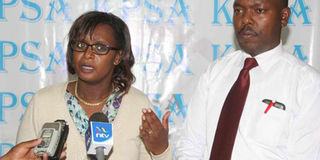Private schools, Knut differ on re-marking of KCSE exams

Mr Ndoro has criticised the Kenya National Union of Teachers' call for an audit of the 2016 KCSE results. PHOTO | JARED NYATAYA | NATION MEDIA GROUP
What you need to know:
- Kenya Private Schools Association’s chief executive officer Peter Ndoro said it is wrong for Opposition leader Raila Odinga and union officials to blame Education Cabinet Secretary Fred Matiang’i for massive failure.
- Mr Odinga has joined the Kenya National Union of Teachers and the Kenya Union of Post Primary Education Teachers in calling for an audit of the results.
The Kenya Private Schools Association has disagreed with teachers’ unions, which have been calling for the re-marking of last year’s Kenya Certificate of Secondary Education (KCSE) examinations, saying the proposal is premature and ill-advised.
The association’s chief executive officer Peter Ndoro said it is wrong for Opposition leader Raila Odinga and union officials to blame Education Cabinet Secretary Fred Matiang’i for massive failure.
He said the results for last year’s KCSE examinations were a reflection of the students’ ability and it is unfair to demonise the Cabinet secretary when many employers have been questioning the quality of graduates.
“Dr Matiang’i has unravelled the mystery that indeed our students have not been passing. We have ben assisting them by moderating these results,” Mr Ndoro.
Mr Odinga has joined the Kenya National Union of Teachers and the Kenya Union of Post Primary Education Teachers in calling for an audit of the results.
Knut Secretary-General Wilson Sossion has said the CS ignored internationally accepted standards for processing examinations as he focused on eliminating cheating cases.
But Mr Ndoro said private schools are satisfied that Dr Matiang’i had managed to stop examination malpractices that risked diluting the quality of education.
FAIR SELECTION
He said they were satisfied with the manner Form One selection was carried out. He said this was a fair process to all the students irrespective of whether they learnt in a public or private schools.
Mr Ndoro faulted a system adopted in the previous years where candidates from public schools were given priority to join better schools, saying it discriminatory and unconstitutional.
He wondered why the government should punish a top performer simply because he comes from a private school yet secondary schools have also been categorised based on the kind of infrastructure they have.
“We want the guidelines for form one selection adopted for this year to be summed up in a document for posterity, in order to have a predictable selection in future,” Mr Ndoro said.
He said selection of students just like grading should be based on performance and not the school one attended, given that the students sit for the same examinations.
Private schools have been performing better than public schools over the years largely due to a lean student-to-teacher ratio and advanced facilities that enhance learning.




